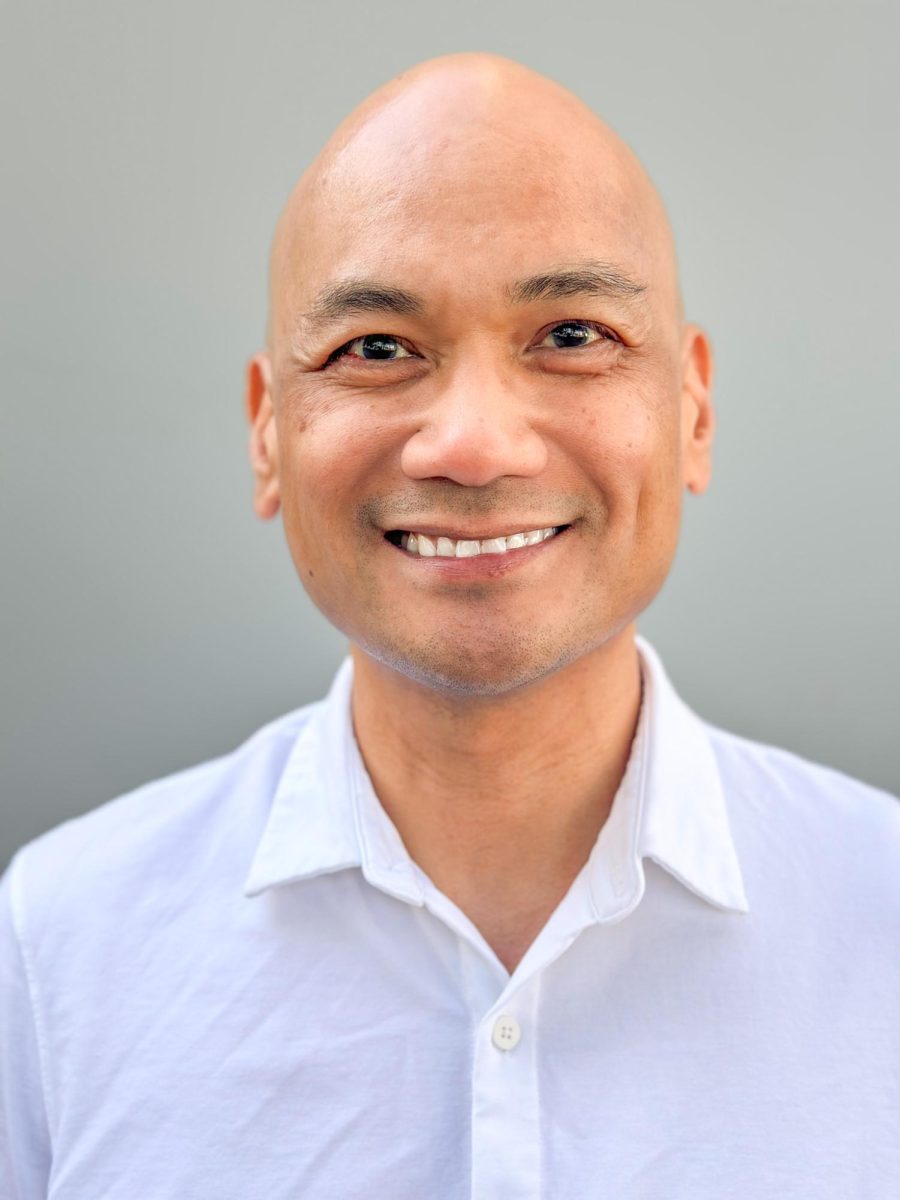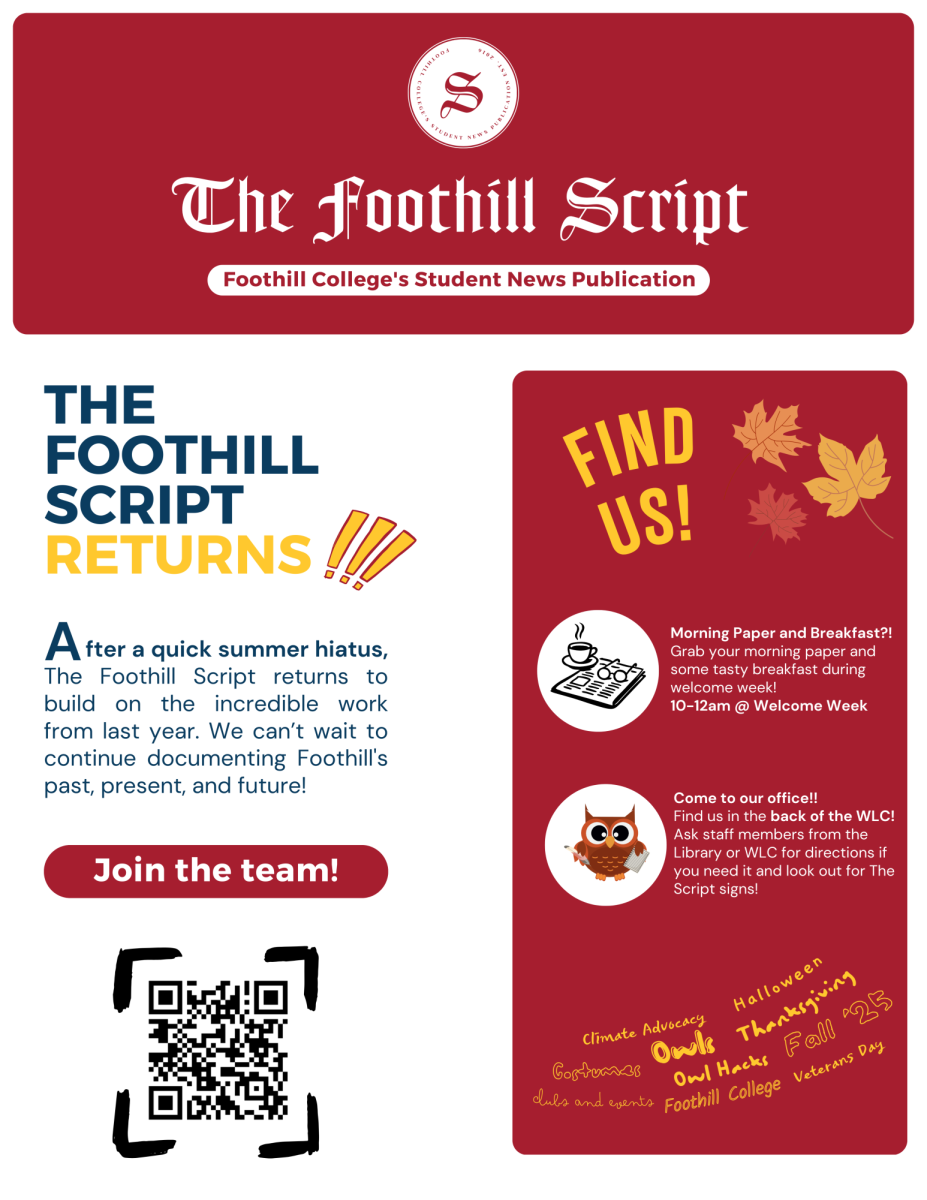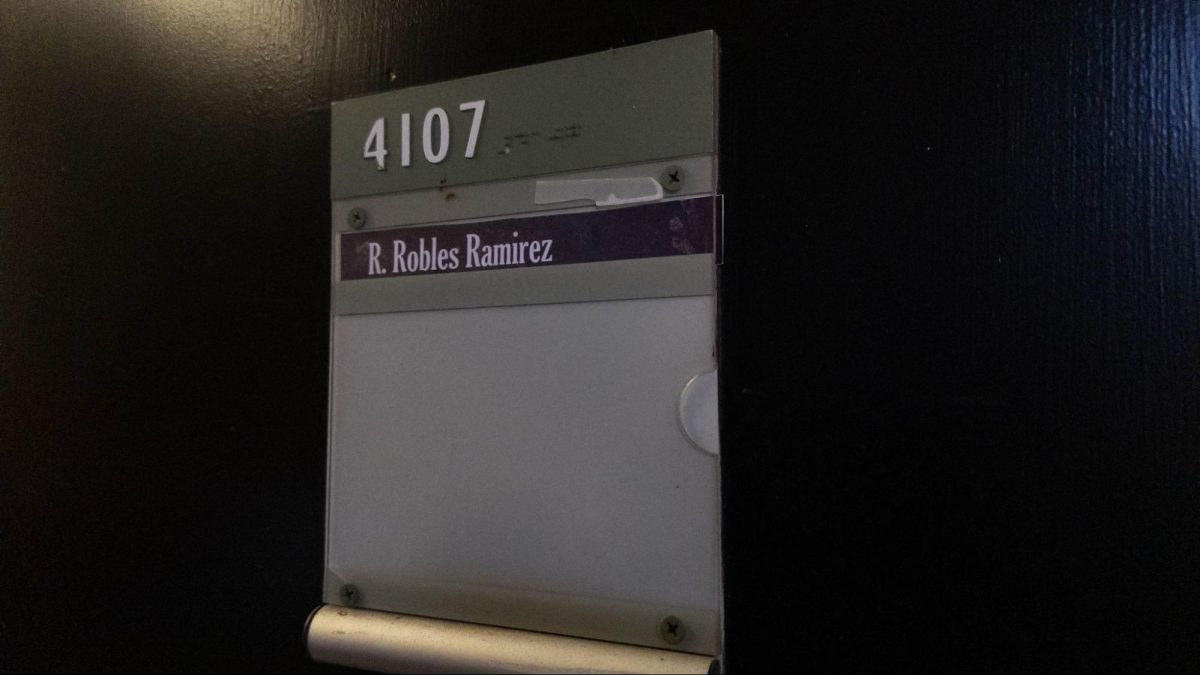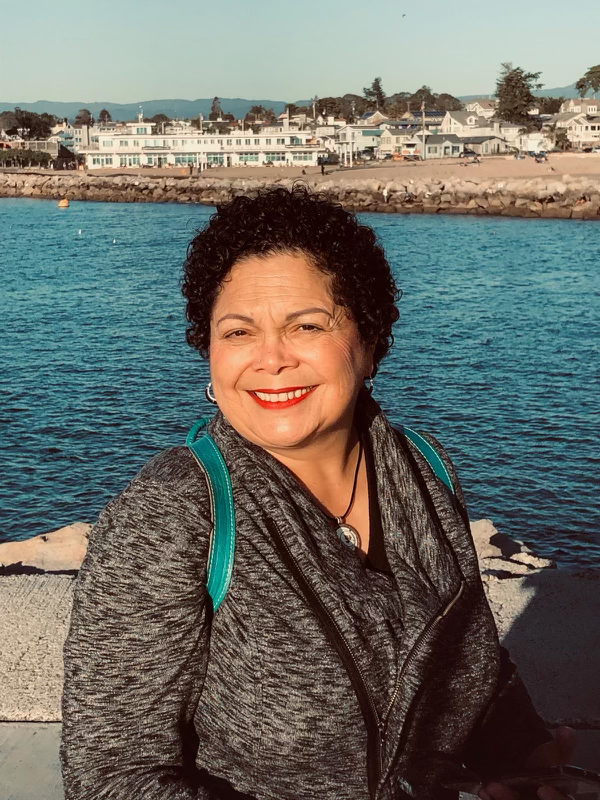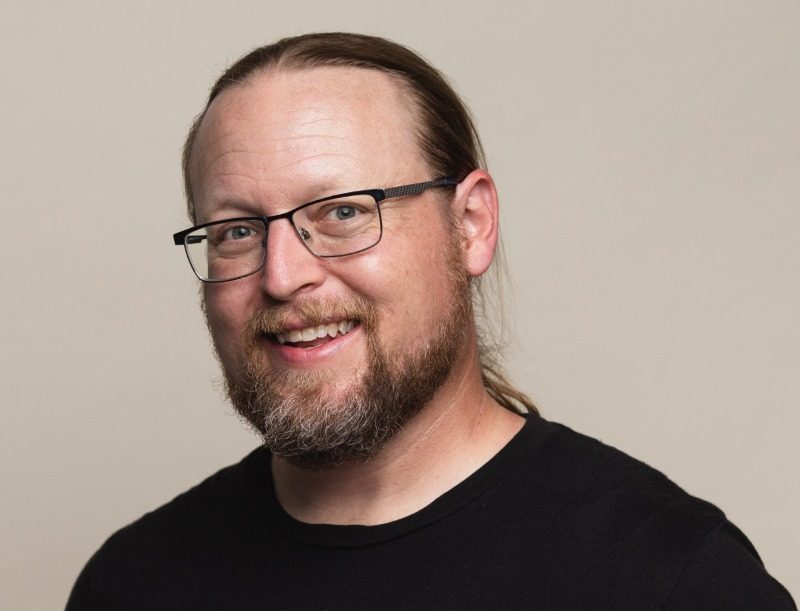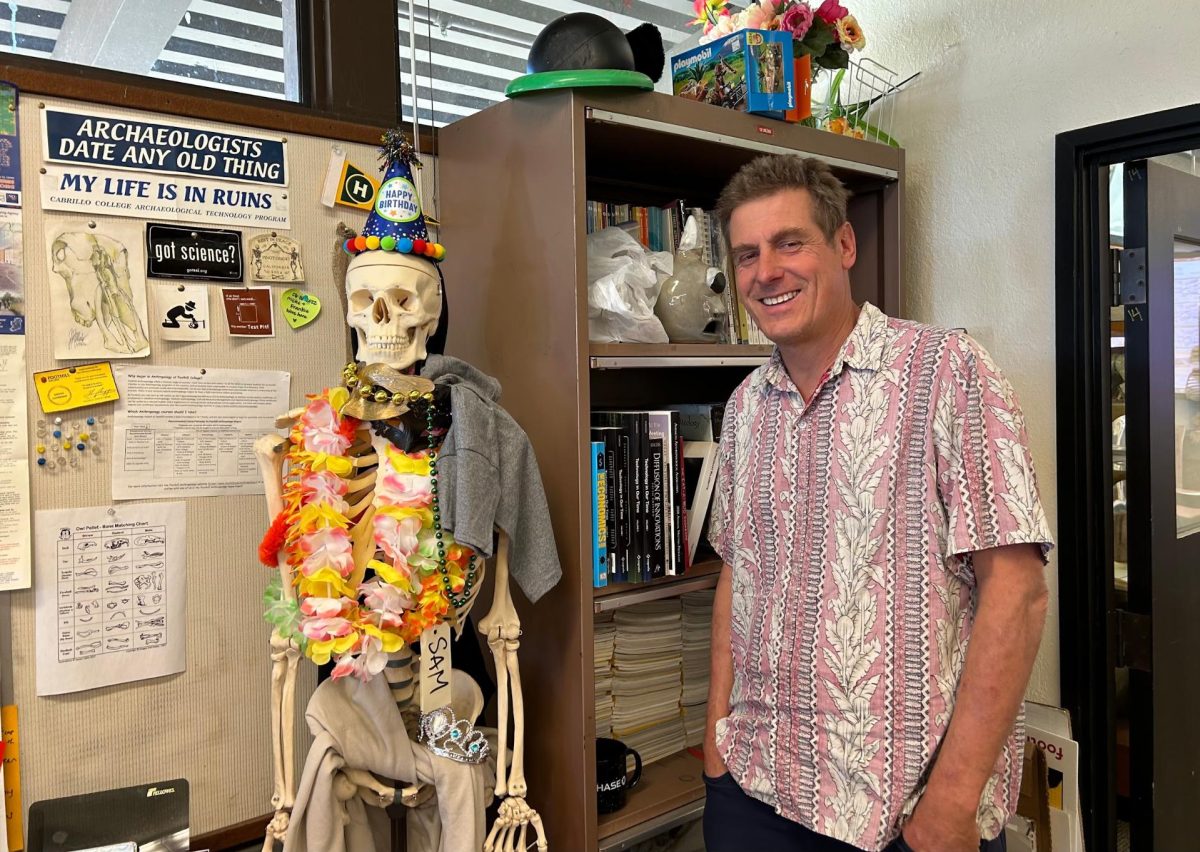Room 4107 looks like any other office in the 4100 block, at least from the outside. The dark black of the door is peeling and chipped in areas, and on the placard a name stands out in bold.
Sitting at the desk inside is Rolando Robles Ramirez, or as many of his students call him “Profe.” The soft pitter patters of Chorizo, Rolando’s furry canine companion, are immediately apparent as he greets me at my entrance.
The room around them is far from plain, filled with books, posters, signs, and even an assortment of LEGO motorbikes. Amongst the assorted literature I see worn covers depicting Malcolm X and creased bindings emblazoned with the name of Malala Yousafzai.
Ramirez is primarily a Calculus teacher at Foothill, teaching 1A, 1B, and Math 12. Though he is an instructor at the college, and for a subject many students find stressful at that, the air in the room is casual. He leans back in his chair as I set up my laptop and voice recorder, absentmindedly petting Chorizo.
Our conversation begins lightly as I prod at him with questions. We start from the beginning, as he describes how his journey through education is not what most would call “average.”
“I was, like, an already, I was in my 20’s when I decided to pursue education as a career,” he says, a somewhat sheepish but proud smile on his face. He talks about his childhood in New Jersey, reflecting with a fond tone as he describes his big family, filled with both siblings and cousins, and the trouble that some of them got into.
“We were just like testing our boundaries…a lot of community service, some of us jail time, and so yeah, for me it’s been an interesting journey going from the kind of a life, going back to school eventually as an adult. Getting a bachelor’s, master’s, and eventually PhD,” Ramirez said, thinking of the obstacles he found in his path towards this moment. When asked on whether his upbringing pushed him towards the path of education, or if it hindered him from approaching it earlier, he leaned towards the latter. He reflected that being an educator was something that he grew to appreciate later in life, commenting that it was only after he “started to read books” that he grew to appreciate it more. Angela Davis, Paulo Freire, and especially histories of Puerto Rico were literature that he pointed to as being influential on his outlook.
Much of Rolando’s views and opinions relate to his deep care for others, and that is reflected in some of the literary works he recommends such as “We Want to Do More Than Survive” by Bettina Love and “Pedagogy of the Oppressed” by Paulo Freire. Rolando may not have all the answers or solutions to issues like the Prison Industrial Complex, the police, and capitalism, but he believes that these systems are fundamentally designed to oppress and need to be dismantled.
Many might view some of Rolando’s views as “radical”, but there is something captivating about the earnest empathy that he constantly displays, and that’s something I’ve seen firsthand in his curriculum. Though much of the discussion I’ve observed amongst students in regards to Rolando’s curriculum is his grading policy, with him having what’s come to be known as an “un-grading” policy, what caught my attention most when first taking one of his courses was the way in which he established healthy boundaries with students, whilst still making himself available for the support they needed. On Saturday and Sunday, Rolando is both not on campus and will also rarely answer email or messages from his students. However, on Monday through Friday he is happy to make an appointment to meet with his students any time he’s free, and accommodates for the hectic schedules many students have through both in-person and digital meetings. Additionally, his listed office hours are more of a guideline than being set in stone, and during the first weeks of the quarter will often poll students on what times work the best for them. When asked on how he came to this structure for supporting his students, Rolando responded that it was important for him to have “a good work-life balance. I want to make sure that I’m supporting my students to the best of my ability, and if I’m working more than what my body can handle, I’m going to be burned out, which means that I can’t support my students.” He further described that he saw it as “super important” to set up those boundaries between himself and his students, and that it equally helps his students to see him “as a human being. Who has a dog, and a partner, and loves to eat delicious food, and loves to hang out with people.”
Rolando further elaborates on how all of this assists in making his classroom better equipped for learning, and allowing for an environment where people feel comfortable and confident in asking questions and making mistakes. He always makes it a point to acknowledge any mistakes he makes in class, no matter how minor, and that it is important for his students to see him own those mistakes, learn from them, and move forward. Rolando spoke more on how he hopes that this all serves to make him approachable, saying that it “makes it easier for students to come to me when they have questions, when they’re struggling with content…I think of part of it as just, like, my approach to a humanizing teaching practice. Where students are more than just a grade and number in my computer and in my notes.”
Beyond Mathematics, Rolando expressed interest in teaching other courses in the future, though he currently does not have the degrees to apply for them yet. High on his list, however, was Ethnic Studies, something we both agreed could become more sought out over time especially due to its recent inclusion into the IGETC. He spoke on how a professor who does Asian American Studies was recently hired at Foothill, and how he looks forward to seeing “what classes they’re going to be offering with him on the faculty.” When asked what area of Ethnic Studies he would be interested in teaching, Rolando expressed a particular interest in covering the history of the Caribbean, and Puerto Rico in particular. Elaborating, he said that would love to “do Caribbean history. Puerto Rico, Cuba, Haiti, all those islands in the Caribbean and how, like, colonization has impacted it and how the ongoing colonization from the United States continues to impact all the people on those islands.” Ramirez, though keeping his usual tone and cadence, was certainly passionate about this topic as he leaned forward in his chair, and this is something that is clear to most once you’ve grown familiar with him, and it’s something that I’ve been able to observe as well. As has been made clear, Rolando has an incredible capacity for empathy, and it’s apparent in his activism, teaching, and even in the way that he interacts with people. Though strides have been made, Rolando noted that it is common in higher education for students to be expected to stress and struggle their way to a degree or drop out, and that’s if they were even afforded the opportunity in the first place. Rolando, who has been on the other side of it, recognizes this all too well, and connects many ideas and patterns in colonialism to how education in the United States is sometimes handled. This was, in fact, how he decided to break away from the traditional grading system in the first place.
When seeking out more information on this topic, Ramirez found lots of research that found grades were more harmful than helpful for the majority of students. Specifically, he explained that “a lot of literature says that grades were made up a long time ago to keep students out of higher education. Things like SATs, all these kinds of exams that were designed to keep specific populations out of educational spaces.” He found that, specifically in Mathematics, grades and examinations were used not just to control students but also to “gatekeep” certain students out of STEM fields. Rolando felt like this was an area where he could make actual and tangible change in the system he saw as needing to change, even if it was only for a small group of students at a time. He describes it as one of the easier ways for him to “bridge the equity gap”, while at the same time helping to facilitate his students further in their learning, as he found that quizzes, exams, and grades did not always tell him that a student was learning and understanding the material, and that it only told him “that a student is able to memorize the process, and then they’re able to mimic the process themselves.”

The classroom is not the only area in which Rolando’s empathy extends to supporting and helping students succeed, as he has helped many students at Foothill in extracurricular activities, with one of the most notable being his position as the club advisor for Owls for Palestine.
Rolando describes his time with Owls for Palestine happily despite the seriousness of their cause, and mentioned how fulfilling it was to support them as OFP learned what their vision for what they want on campus and how he can help them achieve that as their advisor. He also had some criticisms for some of the measures passed recently, such as the time and place policies that came from the Chancellor to be imposed on the campus itself. In his view, these were “strategic maneuvers to repress free speech and limit the things that students can do.” Ramirez noted that this was far something he has only observed at Foothill, as many other campuses at UC’s and CSU’s have passed similar measures that limit what students can and cannot do on campus. Despite this, Rolando was full of praise for Owls for Palestine and how they had adapted to these limitations, and specifically pointed out the great work they have done networking and connecting with other campuses and students at San Francisco State, UC Berkeley, Stanford, our sister college DeAnza, and many more.
“I feel like any change that’s going to happen has to be done through large-scale organizing and community work, because we’re the only ones that are capable of freeing ourselves from these systems. You know, where we’re forced to work to make people rich, and so I think through organizing, through protesting, through community building and mutual aid, that’s how we’re gonna break out of these systems.”
Ramirez’s desire to assist and facilitate Foothill students in their own activism can be tied to what he participated in in his own youth. Before moving to the Bay Area and California in general, he was involved in organizing around issues in Arizona such as the southern border, immigration policy, and the right to work. He described the differences he saw in activism, and its responses, from Arizona to California, and observed that it was much more encouraged in the Bay Area than what he was used to.
“Yeah, I would say it’s definitely more encouraged. You definitely find more people willing to put themselves out there to risk, to engage in civil disobedience, to promote change, and I think the Bay Area is a great place for growth for activists and organizers that want to really meet other people who are doing that labor.”
Rolando did not find the stark difference to be too surprising however, given what he had known about the history of the Bay Area with iconic figures such as the Black Panthers and Cesar Chavez doing so much of their work for equity here. This type of history and language is part of what drew Roland to Los Altos for work specifically, as Foothill College’s equity statement stood out to him, what with how it pointed to not just personal systems of oppression and the goal to dismantle them, but also those at the structural level. Unfortunately, Rolando has felt so far that Foothill College has not lived up to the statement they put out, despite how much he appreciates the work that those who put the statement to pen did. He specifically pointed towards the “type of repression that students and faculty have faced when advocating for Palestinian liberation” as one of the reasons why it has failed to uphold the values stated.
As our time together came to a close, Rolando took the time to extend the spotlight from himself to many groups that do amazing work too. Among them being:
- Trans Queer Pueblo
- Palestinian Youth Movement
- Owls for Palestine
- Bears for Palestine
- Bay Area Boricuas
- Students for Gaza SFSU
- Bay Area Labor for Palestine
Additionally, Rolando has plans to start doing screen printing on campus in the near future for shirts and bags. He is hoping to get as many students involved for the designs, so if you are interested please contact him at [email protected]!


